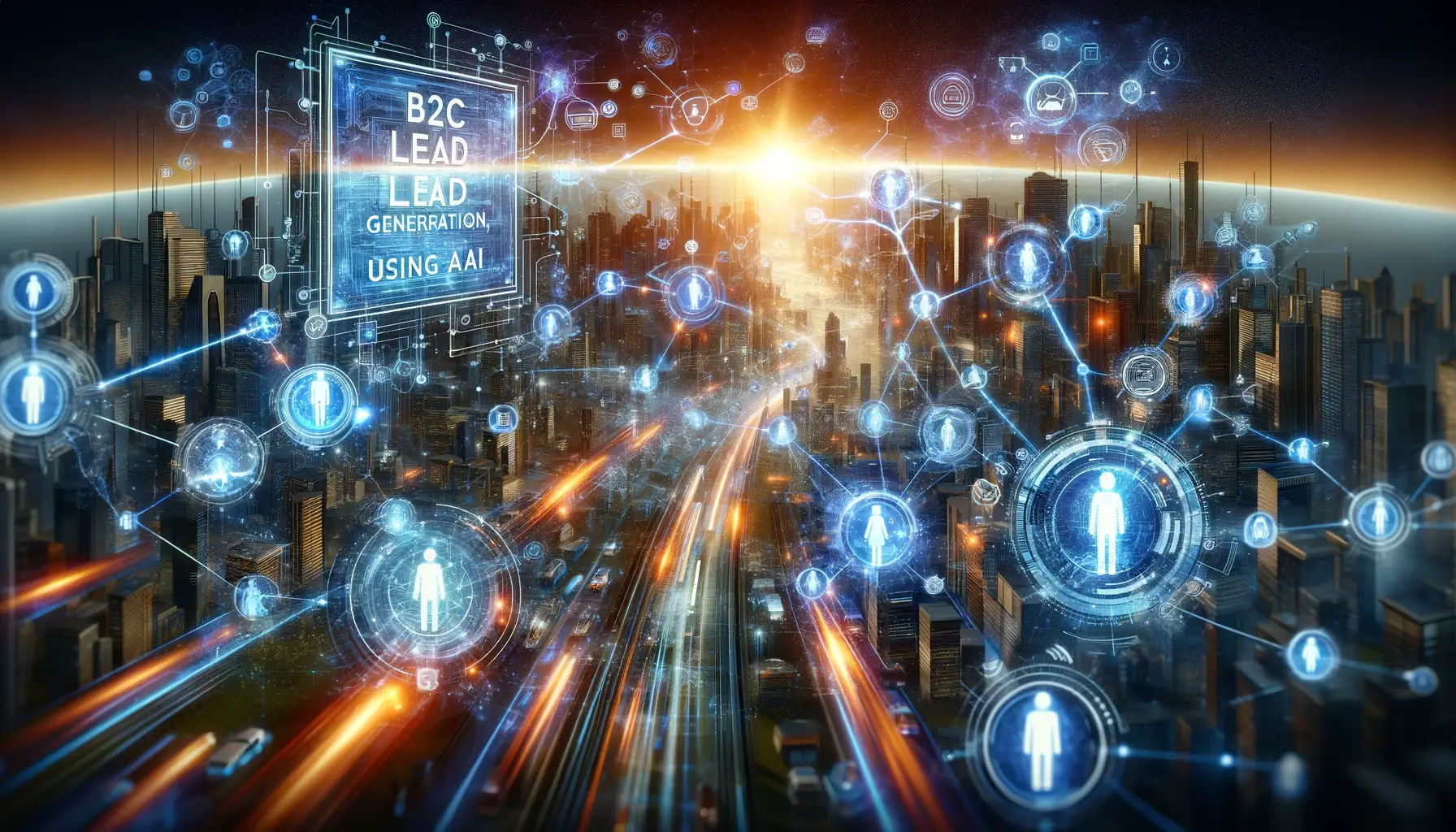In the fast-paced world of Business-to-customer (B2C) marketing, businesses are constantly challenged to capture customer interest and convert it into concrete revenues. This marketing discipline emphasizes on reaching out to individuals and influencing their purchase decisions, which includes not just knowing consumer behavior but also responding to it quickly and efficiently.
The advent of Artificial Intelligence (AI) has transformed this process, giving B2C marketers strong tools to improve lead generation. AI technology in B2C lead generation is more than just a technological update; it represents a fundamental shift in how marketers communicate with customers. It provides unparalleled capabilities in personalization, predictive analytics, and customer engagement, converting potential leads into loyal customers more efficiently than ever before.
Businesses can now evaluate massive volumes of data using AI to discover trends, predict customer demands, and deliver marketing messages at the best times and through the most effective channels. The value of AI in B2C lead generation cannot be emphasized, as it allows businesses to not only meet but surpass their consumers’ changing expectations, assuring relevance in a highly competitive industry.
What is B2C Marketing?
Business-to-Consumer (B2C) marketing refers to the methods and tactics that businesses employ to sell their products and services directly to customers. Unlike B2B (Business-to-Business) marketing, which sells products and services to other businesses, B2C marketing targets individual consumers who make their own purchasing decisions. The fundamental goal is to impact individual consumers by attracting their attention, generating emotions, and eventually persuading them to make a purchase.
Contrast with B2B Marketing
The distinction between B2C and B2B marketing is stark, owing to differences in the target demographic and buying cycles involved. B2C marketing frequently deals with shorter buying cycles because customer purchases are usually motivated by desire, affordability, and immediate need. Decisions are made swiftly, often impulsively, necessitating that B2C marketing strategies be impactful and timely.
In contrast, B2B marketing entails a lengthier purchase cycle with several touchpoints and decision-makers. B2B purchases are typically high-stakes and necessitate a reasonable, benefit-focused approach that includes extensive information and a longer persuasion period. This distinction needs separate marketing strategies for B2C and B2B settings, with B2C focusing on quick conversions and emotional engagement, whilst B2B focuses on relationship development and giving precise, rational information.
Types of B2C Lead Generation: Inbound and Outbound
B2C lead generation can be divided into two main categories: inbound and outbound. Each type employs diverse tactics and focuses on acquiring customers through a variety of channels, which are maximized through the use of AI technologies.
Inbound Strategies
Inbound marketing in the B2C context is the process of developing and sharing valuable content that naturally draws people to your brand and product. This strategy employs technologies such as content marketing, Search Engine Optimization (SEO), and social media engagement:
- Content marketing entails developing entertaining, informative material that meets the demands and interests of potential clients. Content marketing, which includes anything from blog posts and videos to infographics and eBooks, seeks to promote your company as a useful resource, thereby increasing consumer trust and loyalty.
- SEO increases the visibility of your company in search engine results. Businesses may increase organic traffic from people who are actively looking for their products or services by optimizing website content to appear in more relevant search results.
- Social Media Engagement. Using platforms where consumers spend a substantial amount of time enables brands to communicate with potential customers in a casual and conversational manner. This may include sharing material, participating in debates, and reacting to customer inquiries in real time.
Outbound Strategies
Outbound initiatives, on the other hand, involve proactive marketing to consumers via a variety of channels. This may include:
- AI-driven advertising. By using AI to evaluate customer data and forecast purchasing actions, marketers can produce highly targeted adverts. These advertisements are then displayed in locations where potential buyers are most likely to view them, such as social media feeds, websites, and digital platforms.
- Targeted Email Campaigns. Emails are delivered to segmented groups of customers with the purpose of engaging interests that are precisely relevant to their actions and preferences. AI improves this process by calculating the best timing and messaging for these emails, boosting the chances of conversion.
The Role of AI in Enhancing Both Approaches
AI plays an important part in both inbound and outbound B2C lead generating methods. Inbound marketing can use AI to personalize content recommendations, optimize SEO techniques using predictive analytics, and improve social media interaction using chatbots and automated responses. AI’s capacity to evaluate massive volumes of data allows for more precise advertising targeting and email campaign segmentation. AI-powered analytics also provide insights into the efficacy of various initiatives, enabling continual optimization and refinement. As a result, the lead generation process becomes more efficient, capturing and retaining consumer interest more efficiently.
Differences Between B2C and B2B Lead Generation with AI
Audience Targeting and Content Strategies
- B2C Targeting. AI analyzes varied consumer data to provide hyper-personalization, adapting advertising and recommendations to individual interests swiftly in order to capture large consumer markets.
- B2B Targeting. AI helps to segment specialist business audiences by focusing on professional traits and delivering highly specialized content that suits specific business demands.
Decision-Making Processes and Sales Cycles
- B2C Sales Cycles. AI improves B2C marketing by allowing rapid reaction capabilities through tools such as real-time personalized offers and chatbots, which respond to consumers’ impulsive and emotional buying habits.
- B2B Sales Cycles. In B2B, where sales cycles are longer and decisions involve several stakeholders, AI is critical for lead scoring and nurturing, automation of follow-ups, and lead prioritization to enhance conversion rates over time.
Interested in details? Check out our article – Inbound vs Outbound Email Marketing: Difference in 2024
Challenges in Generating B2C Leads
Identifying and Understanding Customer Needs
One of the most difficult issues in B2C lead generation is effectively identifying and understanding consumers’ constantly changing wants and preferences. With trends continually changing and customer behavior impacted by a variety of external factors, businesses must constantly collect and evaluate data to predict what consumers will want next. This necessitates not only advanced analytics to handle vast amounts of data, but also a good understanding of industry trends and consumer psychology.
Addressing Data Privacy Concerns
As the usage of AI in marketing increases, so does the concern over data privacy. Consumers are becoming more aware of how their information is collected and utilized, resulting in increased sensitivity and stronger restrictions regarding data privacy. B2C businesses must carefully negotiate these concerns, ensuring compliance with rules such as GDPR in Europe and CCPA in California while still exploiting consumer data to tailor marketing campaigns. This balance is critical for preserving consumer trust and brand integrity.
Captivating an Audience with Diverse Interests and Behaviours
Developing focused marketing plans that appeal to a wide audience is made very difficult by the variety of consumer interests and habits. Different demographic, geographic, and psychographic sectors make up B2C markets; they are not uniform. Using artificial intelligence (AI) to segment a wide audience and customize marketing messages and campaigns to the unique interests and preferences of various customer groups is necessary. To continue to be successful, this segmentation needs to be dynamic and adjust to continuous changes in customer behavior.
Top 7 Best AI B2C Lead Generation Strategies
1. Personalized Marketing at Scale
Scaled personalization of marketing enables companies to customize their marketing strategies to the unique tastes, actions, and past contacts of each customer. In this domain, AI shines by delving into enormous volumes of data from many touchpoints to provide in-depth customer profiles. These understandings help marketers create offers and communications that speak to every customer on a unique level. AI systems are always learning and adapting from interactions, so over time they get more personalized and greatly raise engagement and conversion rates.
- Step 1: Collect data across various consumer touchpoints.
- Step 2: Use AI to analyze data and segment audiences based on behavior and preferences.
- Step 3: Create personalized content and offers for each segment.
- Step 4: Deploy marketing campaigns across multiple channels.
- Step 5: Use AI to continuously learn from interactions and refine personalization.
2. Predictive Analytics Powered by AI
Using artificial intelligence, predictive analytics projects customer behavior based on past data and patterns. This tactic enables marketers to foresee customer wants, preferences, and possible future behavior, thereby proactively developing more successful marketing plans. Artificial intelligence (AI) powered solutions can forecast a customer’s potential buying readiness, suggest items they might be interested in, and even spot certain churn hazards before they go.
- Step 1: Integrate AI tools with your data systems to gather historical consumer data.
- Step 2: Use AI to identify patterns and predict future consumer behavior.
- Step 3: Develop marketing strategies based on these predictions.
- Step 4: Implement targeted campaigns before peak decision moments.
- Step 5: Measure results and refine predictive models continuously.
3. Chatbots for Quick Customer Contact
Instantaneous answers from chatbots to consumer questions are essential for sustaining interest and increasing conversions. Chatbots driven by artificial intelligence (AI) are capable of a multitude of jobs, including personalized suggestions, product inquiry, and buying process guidance. This quick exchange improves client pleasure and experience, maintains the customer interested in the brand, and raises the possibility of a sale.
- Step 1: Choose a chatbot platform that integrates with your existing systems.
- Step 2: Train your AI chatbot with FAQs and relevant product/service information.
- Step 3: Deploy chatbots on key customer touchpoints like your website and social media.
- Step 4: Monitor interactions and train the AI to handle more complex queries.
- Step 5: Use insights from chatbot interactions to enhance customer profiles.
4. Programmed Advertising for Targeting a Specific Audience
Using artificial intelligence, programmatic advertising purchases and places adverts automatically, guaranteeing that, according to real-time data, the right audience sees the ads. This approach maximizes ad expenditure very well by focusing on users who are most likely to convert, therefore raising ROI. AI ensures relevance and efficacy of advertisements by analyzing user behavior, context, and demographics in a split second.
- Step 1: Set up programmatic advertising platforms with access to your consumer data.
- Step 2: Define your target audience parameters using AI analysis.
- Step 3: Create compelling ad content tailored to the target audience.
- Step 4: Launch and monitor ad placements in real-time.
- Step 5: Continuously optimize campaigns based on performance analytics.
Eager to learn more? Our related article has all the answers – Facebook Lead Generation Ads: Strategy + Examples [w/AI]
5. Delivering Dynamic Content
Using artificial intelligence, dynamic content delivery modifies what a user sees in real time according on their interactions and engagement habits. This approach applies artificial intelligence (AI) to real-time data analysis to customize app interfaces, email marketing, and website experiences to better meet the unique requirements of every user. Businesses may dramatically increase engagement and retention rates by dynamically adapting content to the user’s preferences and past actions.
- Step 1: Implement AI-driven content management systems.
- Step 2: Tag and categorize content for different audience segments.
- Step 3: Set parameters for content personalization based on user behavior.
- Step 4: Test content variations to determine the most effective options.
- Step 5: Analyze engagement and adjust content delivery strategies accordingly.
6. Optimizing Voice Search
Increasingly, speech-activated gadgets are being used, hence voice search optimization is essential. AI facilitates the comprehension and processing of natural language questions so that voice searches for your goods and services return results. In order to improve visibility in a developing search channel, content must be optimized for more conversational keywords and information must be structured such that voice search engines may simply interpret and provide to users.
- Step 1: Research common voice search queries related to your products/services.
- Step 2: Integrate these queries into your content using a conversational tone.
- Step 3: Optimize website metadata with voice search keywords.
- Step 4: Test voice search performance and refine based on findings.
- Step 5: Stay updated with changes in voice search algorithms and adjust strategies.
7. Using AI to Involve Emotions
Brands may create marketing messages that more emotionally connect with their audience by using AI to analyze data and comprehend customer emotions and sentiment. AI can assist tailor experiences in a way that appeals to the emotions through the tone of content, the time of delivery, or the kind of media used, strengthening bonds and fostering loyalty. Through emotional connection, this approach leverages the psychological elements of marketing to improve the efficacy of campaigns.
- Step 1: Use AI tools to analyze customer sentiment and emotional triggers.
- Step 2: Develop content and marketing messages that align with identified emotions.
- Step 3: Segment audiences based on emotional responses and tailor campaigns.
- Step 4: Monitor campaign performance and gather feedback on emotional impact.
- Step 5: Refine emotional targeting strategies to enhance connection and loyalty.
Want to know more? Read also – AI Lead Generation: Strategy, Examples, Practices & More!
5 Examples of Successful B2C AI Campaigns
1. Sephora’s Virtual Artist App
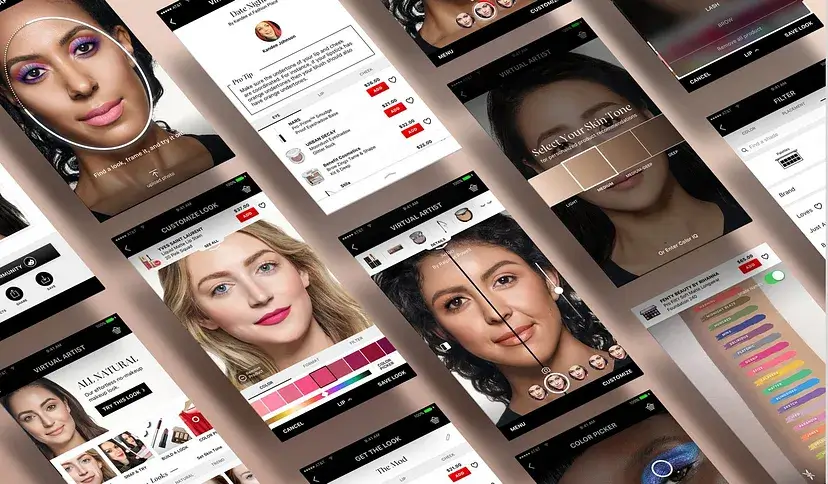
- Industry: Retail (Cosmetics)
- AI Application: Augmented reality and AI to allow users to try on makeup virtually.
- Results: The app led to an increase in customer engagement and significantly boosted online sales. It also increased in-store traffic as customers visited to try the makeup in person after using the app.
- Takeaways: Integrating AI with AR can enhance the online shopping experience, providing a fun and interactive way for customers to engage with products.
2. Netflix’s Personalized Recommendations
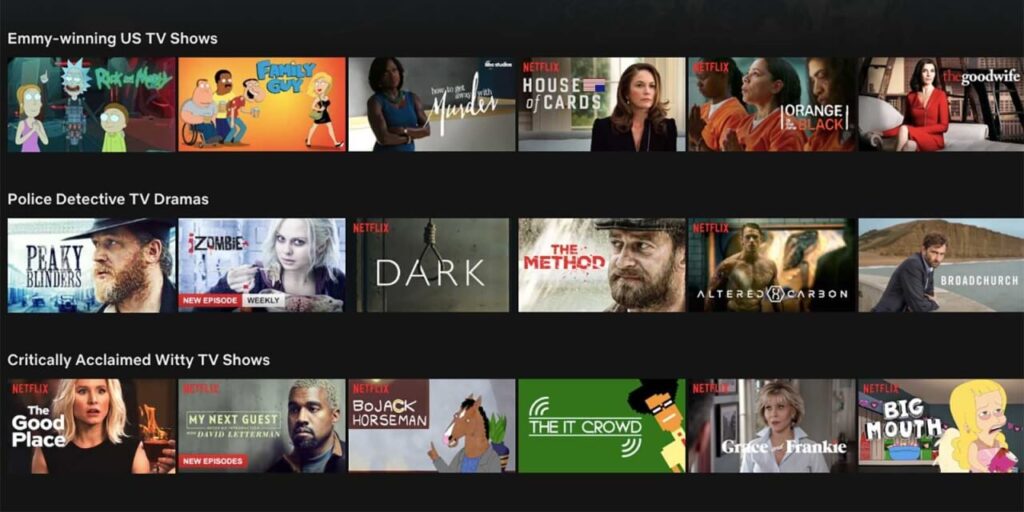
- Industry: Entertainment (Streaming)
- AI Application: Machine learning algorithms to analyze viewing habits and provide personalized content recommendations.
- Results: Netflix attributes over 80% of watched content to its recommendation engine, drastically reducing churn and increasing viewer satisfaction.
- Takeaways: Effective use of AI in personalization can significantly improve user engagement and retention by making it easier for users to find content they love.
3. Zara’s AI-Powered Store Management
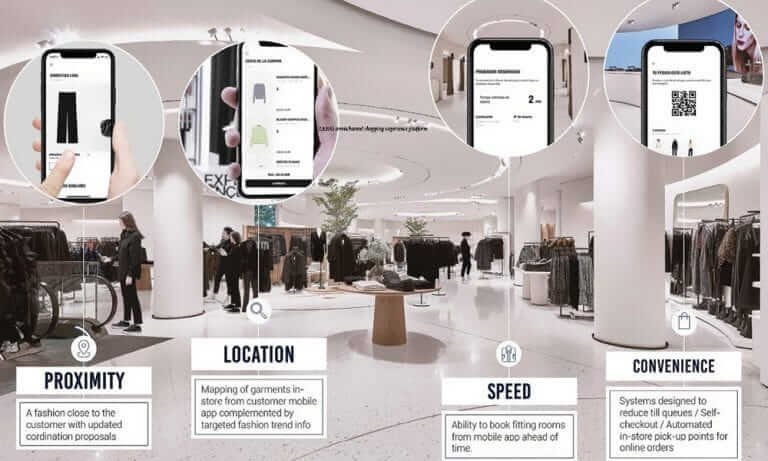
- Industry: Retail (Fashion)
- AI Application: AI algorithms to predict trends, optimize stock, and manage inventory in real-time across stores globally.
- Results: Improved stock management led to a decrease in overstock and understock situations, maximizing sales and reducing markdowns.
- Takeaways: AI can streamline supply chain operations and enhance the shopping experience by ensuring product availability aligned with current consumer trends.
4. HealthTap’s AI Health Advice
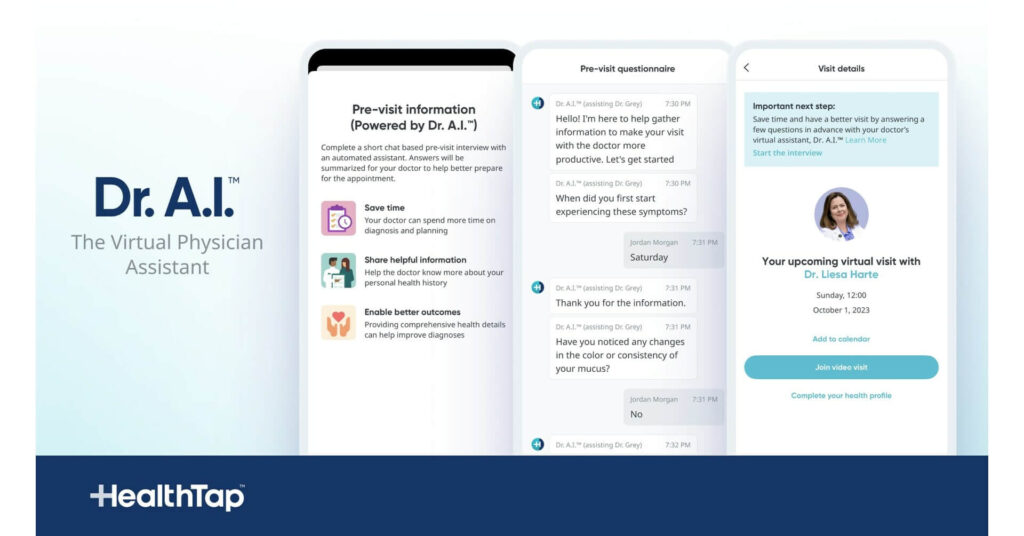
- Industry: Healthcare
- AI Application: AI-powered chatbots to provide basic medical advice and triage symptoms before engaging with real doctors.
- Results: The platform significantly reduced unnecessary doctor visits and provided quick preliminary advice, increasing patient satisfaction and efficiency.
- Takeaways: AI can effectively extend healthcare services, making them more accessible while reducing strain on healthcare providers.
5. Domino’s AI-Enhanced Ordering
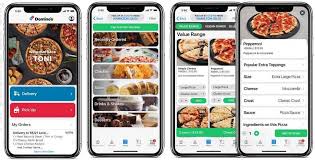
- Industry: Food Service
- AI Application: Natural language processing systems to take orders via voice both in-app and through smart home devices.
- Results: The implementation led to an increase in order accuracy and customer satisfaction. Domino’s reported a substantial boost in mobile orders, contributing to higher sales.
- Takeaways: AI can simplify and enhance the ordering process, creating a seamless customer experience that drives sales and loyalty.
Discussion of Top Tools for AI-Driven B2C Lead Generation
1. AnyBiz.io
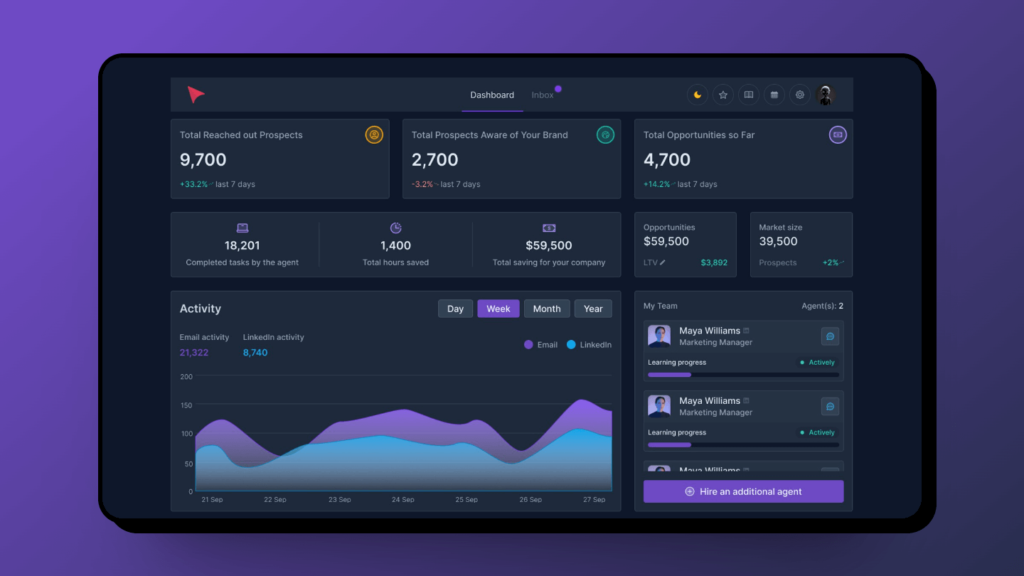
AnyBiz is unique among lead generating solutions in that it skillfully serves both B2C and B2B markets. AnyBiz gives a special edge in the cutthroat industry by smoothly automating and improving sales procedures by using the potential of sophisticated AI.
Main Features of AnyBiz
AI Sales Agents. AnyBiz deploys AI-driven sales agents that automate the traditional roles of Sales Development Representatives (SDRs). These agents are programmed to craft personalized, multi-channel outreach sequences that ensure maximum engagement with each prospect.
Continuous Operation. Operating 24/7, the AI sales agents align with prospects’ time zones, allowing for around-the-clock interaction. This is crucial for maintaining momentum in lead nurturing and conversion, particularly valuable in the B2C sector where consumer engagement can significantly fluctuate throughout the day.
Smart Decision-Making. The platform’s ability to make billions of automated decisions ensures that each outreach is strategic and purposeful. With the capability to analyze over 10,000 data points per hour, AnyBiz offers a level of precision that significantly enhances lead targeting and engagement strategies.
Multi-Channel Engagement and Personalization. AnyBiz guarantees a highly customized communication whether it be by email, LinkedIn, or Twitter. Ideal for both B2C and B2B situations, this strategy not only builds relationships but also increases brand exposure across several channels.
Automated Email Classification and Response. The advanced technology of the platform can automatically respond to and categorize incoming emails, therefore preserving regular and customized contact with prospects.
AI’s Impact on Lead Generation
The integration of AI in AnyBiz has profound impacts:
- Enhanced Efficiency. By automating routine tasks and decisions, AnyBiz allows businesses to focus on strategy and growth.
- Increased Conversion Rates. Through targeted and personalized approaches, the platform ensures that businesses connect with high-potential leads, driving up conversion rates.
- Scalability. The AI-driven processes are designed to scale, accommodating an increase in lead volume without compromising on quality or engagement.
All things considered, AnyBiz offers a strong, AI-enhanced platform that efficiently handles lead generation for both B2C and B2B, enabling companies to optimize their outreach potential and greatly increase their conversion rates. AnyBiz produces better performance and outcomes whether it is used for B2B client engagement or B2C customer targeting.
2. LaGrowthMachine
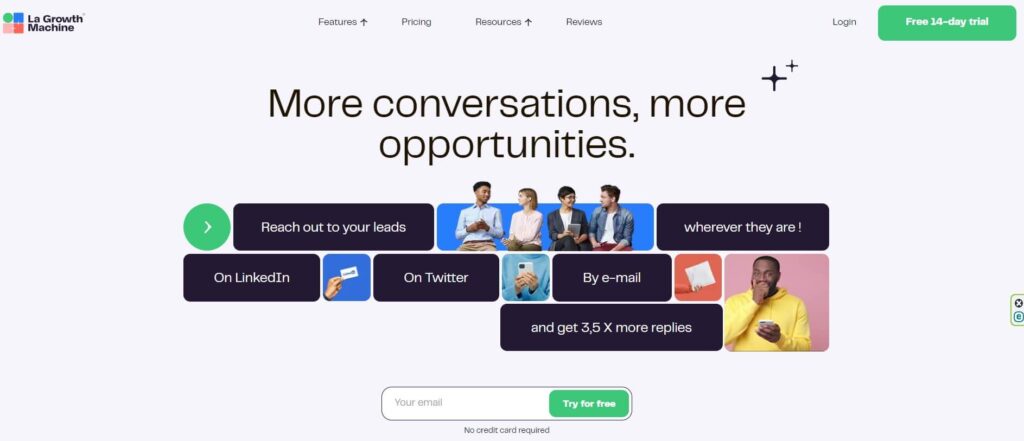
LaGrowthMachine is a dynamic automation tool designed to boost lead generation and outreach efforts across multiple channels such as LinkedIn, email, and Twitter. This tool is particularly beneficial for organizations looking to execute coordinated multi-channel campaigns, which amplify touchpoints and enhance conversion rates.
AI-driven Automation Features
Personalized Messaging. Leveraging AI, LaGrowthMachine tailors messages according to the behavior and engagement data of prospects across various platforms, significantly improving the relevance and impact of each interaction.
Engagement Tracking. The system utilizes AI to track responses and interactions, dynamically adjusting campaign strategies to achieve optimal engagement and the highest conversion rates.
3. Phantombuster
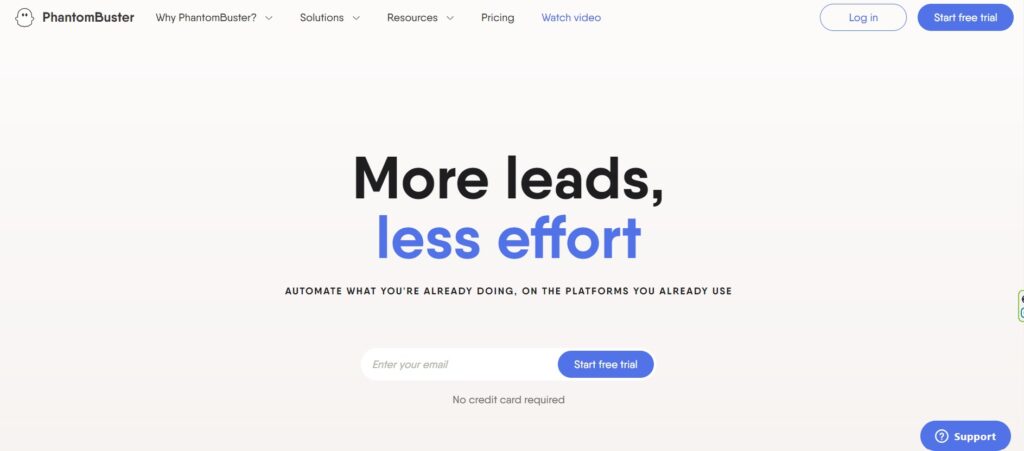
Phantombuster is a cloud-based automation platform that provides a suite of APIs enabling users to scrape data, automate tasks, and interact with various online services, thereby enhancing productivity and data management. It is widely used for a range of activities from lead generation to social media automation, making it an essential tool for marketers and data analysts.
AI Tools for Data Extraction and Campaign Automation
Data Extraction. The platform utilizes artificial intelligence to smartly extract data from web pages and social media platforms, transforming it into formats ready for analysis and lead generation.
Campaign Automation. AI is employed to streamline repetitive tasks across campaigns, such as messaging, following users, and posting content, while continuously optimizing these actions based on user engagement and response metrics.
4. Hunter.io
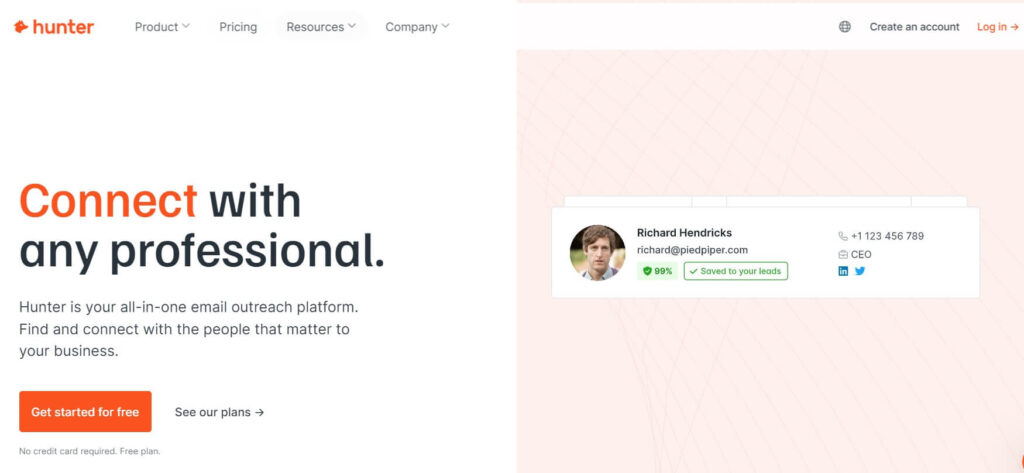
Hunter.io is a widely-used tool that simplifies the process of finding and validating email addresses, facilitating smoother interactions with leads and important contacts. Primarily designed for marketing professionals, recruiters, and sales teams, Hunter.io enhances outreach efforts by providing precise contact information and advanced lead management tools.
AI Features for Email Verification and Lead Scoring
Email Verification. Utilizing AI algorithms, the platform validates email addresses, reducing bounce rates and ensuring that communications reach active inboxes.
Lead Scoring. The AI assesses the potential value of leads based on email engagement and other relevant data, enabling users to more effectively prioritize their outreach strategies.
5. AeroLeads
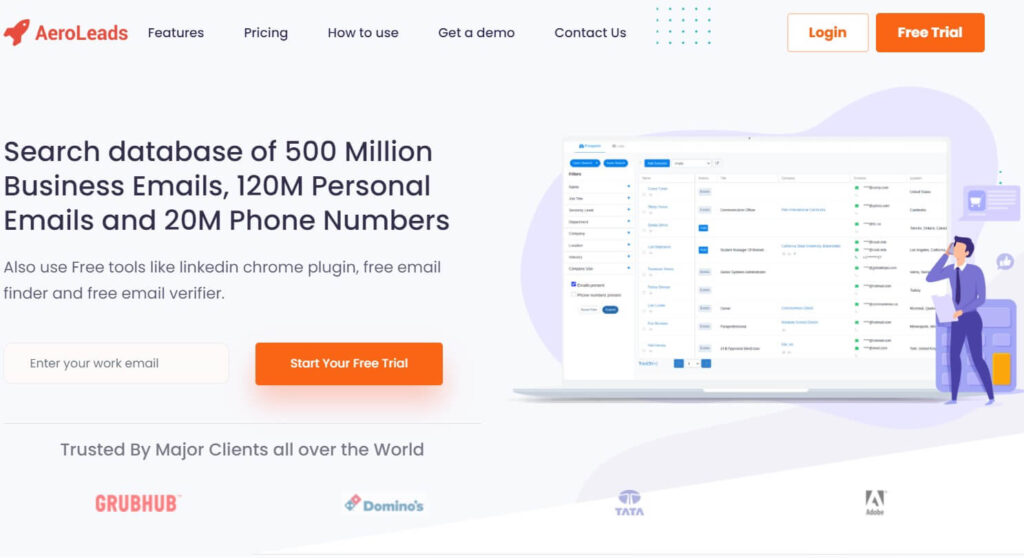
AeroLeads is a powerful cloud-based tool designed for lead generation and prospecting, enabling businesses to locate email addresses and contact details for new clients and business leads. Commonly utilized by sales professionals and marketers, AeroLeads enhances outreach and lead generation efforts by supplying verified contact information across various industries.
AI Functionalities for Data Mining and Contact Information Gathering
Data Mining. AI algorithms efficiently search the web for critical contact data, such as emails and phone numbers, by scanning multiple sources and compiling the results in real time.
Contact Information Gathering. The AI system aids in verifying and enriching contact details, ensuring the accuracy and currency of the information provided, thereby bolstering the effectiveness of sales and marketing campaigns.
Conclusion
It has shown to be not just advantageous but revolutionary to include artificial intelligence into B2C lead generating. Because AI can analyze enormous datasets and personalize interactions on a massive scale, companies may now engage with customers more successfully than ever. Deeper consumer insights, more focused marketing initiatives, and improved customer experiences made possible by AI technologies result in higher conversion rates and long-term business expansion.
Anticipating even more sophistication in AI, the next generation of marketing breakthroughs will be driven by developments in machine learning models, predictive analytics, and natural language processing. More user-friendly AI systems that create more interesting content, precisely automate intricate marketing plans, and even more accurately predict customer wants are what we can expect.
Considering these developments, using AI-enabled technologies like AnyBiz can greatly improve your marketing campaigns. AnyBiz.io is prepared to satisfy, if not beyond, the contemporary marketing needs of both B2C and B2B businesses with its extensive feature set driven by AI.
Let your company lag behind in a market driven by AI and growing in competition.
Related article:
- LinkedIn Lead Generation Strategies with AI [0 to Hero]
- Lead Generation for Small Businesses: Proven Strategies with AI
- Proven 10 Lead Generation Strategies for Startups with AI
FAQ
What is lead generating for B2C driven by AI?
Using artificial intelligence tools to more successfully find, interact with, and convert consumer prospects is known as AI-driven B2C lead generation. To maximize the lead generating process, AI aids in data analysis, behavior prediction of consumers, customization of messages, and interaction automation.
In what ways does AI enhance lead targeting accuracy in business-to-consumer marketing
By using data analytics to decipher consumer preferences, habits, and actions, AI improves lead targeting. This raises the relevance and efficacy of marketing initiatives by enabling companies to develop very focused campaigns that directly address the requirements and interests of particular customer segments.
Will AI in B2C lead generating lower marketing expenses?
Yes, AI may save marketing expenses a great deal by automating repetitive operations, enhancing lead qualifying procedures, and optimizing marketing campaigns. This lowers the requirement for sizable marketing staff and, via better targeting and segmentation, decreases waste.
Which B2C lead generating instances of AI tools exist?
Examples are chatbots improved with AI, predictive analytics tools, personalised content management systems, and programmatic advertising platforms. These instruments support the automation and improvement of several lead generating processes.
In what ways might AI customize consumer experiences for B2C lead generating?
By modifying offers and communications based on information from previous contacts, social media posts, and online consumer behavior, AI personalizes client encounters. Concurrently, this customisation can happen on emails, social media posts, and website content.
What are the obstacles in using AI in B2C lead generation?
These obstacles include monitoring the quality of data supplied into AI systems, integrating AI with current marketing platforms, and keeping up with the quickly evolving AI technology.
How does AI appear to develop in B2C lead generating going forward
AI technology developments are still advancing, hence the future of AI in B2C lead generation is bright. Better chatbot interactions through more sophisticated natural language processing, improved predictive analytics for more precise forecasting of consumer behavior, and more AI integration across all digital marketing platforms to offer a single customer experience are among the advancements to be expected
